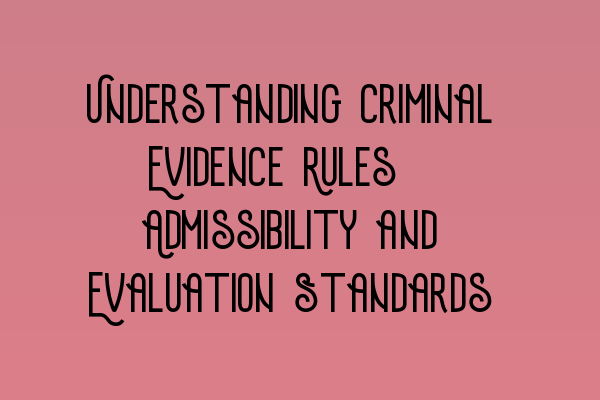Understanding Criminal Evidence Rules: Admissibility and Evaluation Standards
When it comes to criminal cases, understanding the rules surrounding the admissibility and evaluation of evidence is crucial for both defense and prosecution. Adhering to these rules ensures a fair and just legal process for all parties involved. In this comprehensive guide, we will delve into the intricacies of criminal evidence rules in the UK, providing you with the knowledge to navigate the complexities of criminal law.
Admissibility of Evidence
The admissibility of evidence refers to whether or not evidence is allowed to be presented in court. There are certain criteria that must be met for evidence to be considered admissible:
- Evidence must be relevant to the case at hand. It must have a direct bearing on the guilt or innocence of the defendant.
- Evidence must be legally obtained. It cannot be obtained through illegal means, such as a breach of privacy or violation of constitutional rights.
- Evidence must be reliable and credible. It must be able to withstand scrutiny and be sufficient to form a reasonable belief in the guilt or innocence of the defendant.
- Evidence must not be subject to any exclusionary rules. There are certain types of evidence that are considered highly prejudicial and may be excluded to ensure a fair trial.
Understanding the admissibility of evidence is crucial for building a strong defense or prosecution strategy. Failure to meet the admissibility criteria can weaken your case and potentially lead to the exclusion of key evidence.
The Workshops and Seminars on Criminal Practice: Expanding Your Expertise article provides invaluable insights for legal professionals seeking to enhance their knowledge and stay up-to-date with the latest practices in the field.
Evaluation Standards
Once evidence is deemed admissible, it is subject to evaluation by the court. The evaluation process involves assessing the weight and credibility of the evidence presented. Courts use various evaluation standards to determine the probative value of evidence:
- Beyond a Reasonable Doubt: In criminal cases, the standard of proof is “beyond a reasonable doubt.” This means that the evidence presented must convince the court, with moral certainty, that the defendant is guilty.
- Balance of Probabilities: In civil cases, the standard of proof is lower and is based on the “balance of probabilities.” This means that the evidence must establish that it is more likely than not that the defendant is liable.
Evaluating evidence requires a deep understanding of legal principles and precedents. Legal professionals should continuously seek Updates in UK Criminal Laws: Staying Informed and Prepared to ensure they are well-versed in the latest developments.
It is important to note that the credibility of witnesses can greatly impact the evaluation of evidence. Factors such as witness demeanor, consistency in testimony, and potential bias are taken into consideration by the court.
To further enhance your understanding of criminal evidence rules, consider joining a study group. Enhancing Your SQE Criminal Law Study Group Experience is a resourceful article offering tips and strategies to make the most out of your study group sessions.
Conclusion
Understanding criminal evidence rules is essential for legal professionals involved in criminal law cases. Adhering to the admissibility and evaluation standards ensures a fair legal process and allows for the presentation of reliable and credible evidence. Continuous learning and staying updated with Decoding Criminal Evidence Rules: A Detailed Analysis is crucial for success in this field.
Furthermore, it is crucial to remember that criminal cases involve not just the accused but also the victims. Ensuring the rights of victims in criminal procedures is of utmost importance. Explore Ensuring Rights of Victims in Criminal Procedures: Legal Protections and Support to gain insights into the legal protections and support available to victims.
